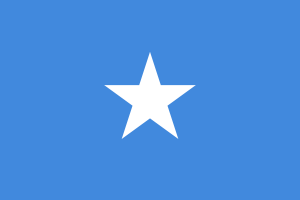Language/Somali/Vocabulary/Feelings-and-Emotions
Hi Somali learners! 😊
In this lesson, we will learn about feelings and emotions in Somali. It is important to be able to express how we feel in any language. By learning the vocabulary for feelings and emotions, you will be able to communicate more effectively in Somali.
Consider broadening your understanding by checking out these related lessons: Numbers 1 20 & Introducing Yourself.
Vocabulary[edit | edit source]
Here is a list of feelings and emotions in Somali, along with their pronunciations, and English translations:
| Somali | Pronunciation | English Translation |
|---|---|---|
| Afraid | ka xoogeyn | Afraid |
| Angry | wax daaranaa | Angry |
| Anxious | ku sugan | Anxious |
| Bored | qofka la baabi'in | Bored |
| Calm | furan | Calm |
| Confused | xumaan | Confused |
| Content | waqti dheer | Content |
| Curious | uu dhaqmaay | Curious |
| Depressed | ogaanshaha | Depressed |
| Disappointed | degdeg ku baxay | Disappointed |
| Disgusted | dheekaysan | Disgusted |
| Embarrassed | ujeedio | Embarrassed |
| Enraged | jidh-dil ka xumay | Enraged |
| Excited | farxad leh | Excited |
| Exhausted | dhacday | Exhausted |
| Fearless | aan xumaanayn | Fearless |
| Frustrated | ka baxeen kaalgooyaha qalbiga | Frustrated |
| Grateful | mahadsanid | Grateful |
| Guilty | ka khatar tabaneysa | Guilty |
| Happy | farxad | Happy |
| Heartbroken | dhibaato ka hadlay | Heartbroken |
| Hopeful | rajaysta | Hopeful |
| Horrified | shirar iyo sifo-dhaxalsi ka muuqato | Horrified |
| Humiliated | ixtiraamay | Humiliated |
| Hurt | cadaawgiisii ugu fiican yahay | Hurt |
| Impatient | qofka la joogaaga | Impatient |
| Indecisive | aan lahayn qalab lagu huto | Indecisive |
| Insecure | aan keentay inaan ku celin xaaladaan | Insecure |
| Jealous | iska jar | Jealous |
| Lonely | qofkastoo jooga aniguu kaad | Lonely |
| Loved | la qaldaadeeyey | Loved |
| Melancholy | afqabeen | Melancholy |
| Motivated | mar kaa fiyo | Motivated |
| Nervous | nara dheer | Nervous |
| Peaceful | nabadoon | Peaceful |
| Pessimistic | farxad layn ahayn in xasuuq ka dhacday | Pessimistic |
| Playful | Playable | |
| Proud | mid gaaban ka tahay | Proud |
| Relaxed | mashquul aan lahayn | Relaxed |
| Relieved | leexsan yahay | Relieved |
| Sad | dhibaato ka hadlay | Sad |
| Satisfied | ku sarreeyaan | Satisfied |
| Scared | ka xiyeeya | Scared |
| Self-Conscious | self-conscious | |
| Shocked | waa dhimashay | Shocked |
| Shy | xasawgii jiray | Shy |
| Sorry | ka xumaa | Sorry |
| Stressed | cadawga goyska ah | Stressed |
| Surprised | madow ayaan jeedsanay | Surprised |
| Suspicious | isbedelka | Suspicious |
| Sympathetic | gaarsiyaan | Sympathetic |
| Thankful | mahadda leh | Thankful |
| Tired | dhacdo | Tired |
| Uncomfortable | Uncomfortable | |
| Unhappy | Unhappy | |
| Upset | murugsan | Upset |
Dialogue[edit | edit source]
Here is a dialogue between Sama and Hassan, expressing their feelings in Somali:
- Sama: Maanta waa aaba haatan sii dheeri karaa. (Today I feel tired)
- Hassan: Aaba haatan sii dheeri karaa? Ma taqaanaa nin ha ahaado Somali. (Tired? Maybe you need a Somali husband.)
- Sama: La' siinayaa. Aniga waa way ka caawineyn. Caws kula hayo. (No, thanks. I need some rest. Bring me tea.)
- Hassan: Haa, hadduu Alla idmo tahay anigu ma keeni karayn 'therapy.' Waxaan ku jiraa dhul wanaagsan. (Yes, if God wills, I can't offer you therapy services. I live in a beautiful place.)
Culture and Interesting Facts[edit | edit source]
Somalis are known for their hospitality and for expressing their feelings deeply. A person may be asked, "Ma ku qancin karaa?" which means, "How are you feeling?" It is not uncommon to express how you feel in Somali culture, whether it is positive or negative. It is important to be sincere when asking and answering such questions.
In Somali tradition, a person is not supposed to express too much joy or happiness, especially in public. This is rooted in the concept of balance and humility, which emphasizes the importance of being moderate in all things.
Somalis also have a rich tradition of poetry and song, which often express feelings of love and longing, as well as grief and sadness. Poetry is an important part of Somali culture, and often reflects the experiences of everyday life.
If you want to learn more about Somali culture and language, the Polyglot Club website is a great resource to find native speakers and ask them any questions. You can also improve your Vocabulary by visiting the Somali vocabulary page.
Sources[edit | edit source]
➡ If you have any questions, please ask them in the comments section below.
➡ Feel free to edit this wiki page if you think it can be improved. 😎
Other Lessons[edit | edit source]
- Count to 10
- Clothes
- Languages
- Days of the Week
- House
- Family and Relatives
- Food
- Health
- Fruits and Vegetables
- Numbers

